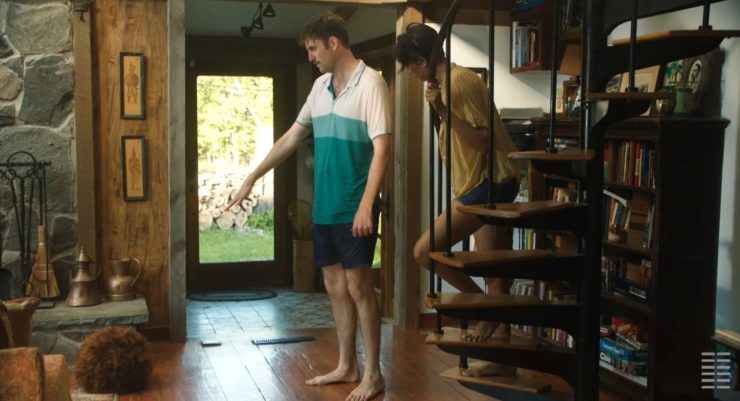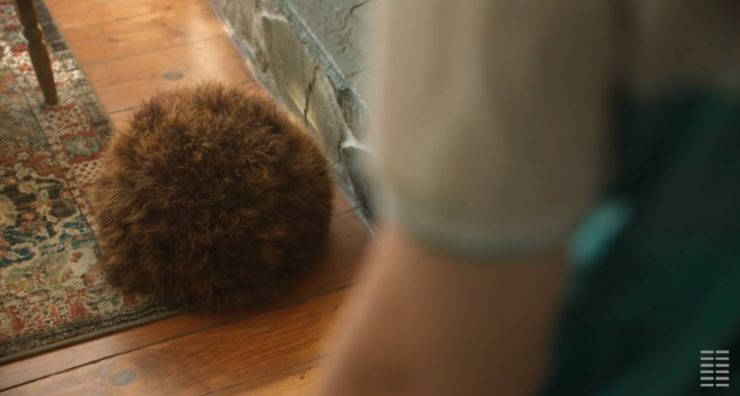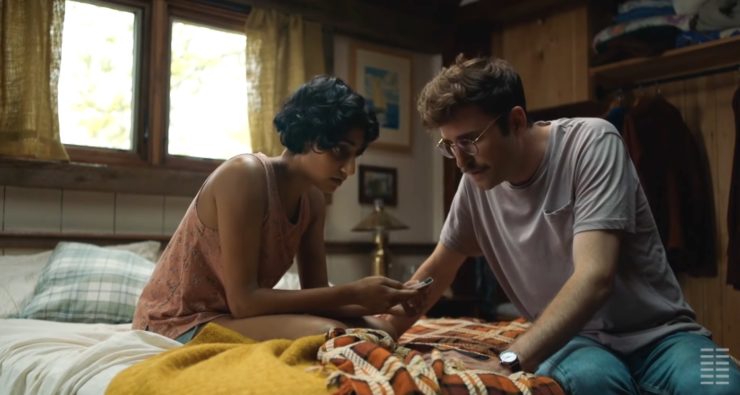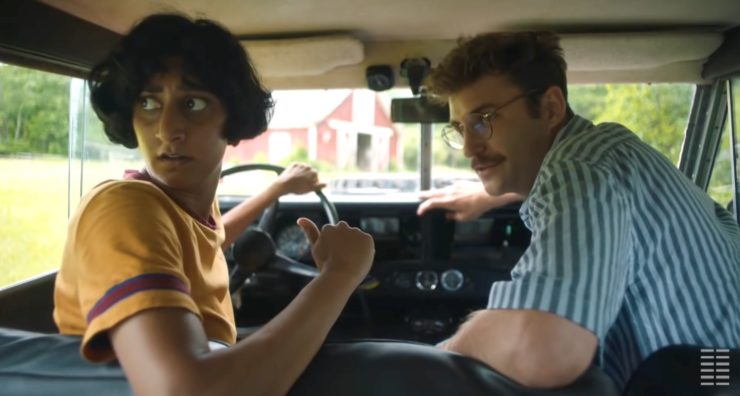Some films seem to be made with such an explicit audience in mind, you find yourself wondering what anyone outside that core demographic is bound to think. There was a time when geeks felt that way about most genre films, particularly those of a superhero bent—you could usually tell them based on who sat around with a captive circle of friends to explain the latest MCU post-credits sequence, but the truth of the matter is that blockbusters are intended to be for as many people as possible.
On the other hand, watching Save Yourselves! was both comfortably and uncomfortably like hearing the inside of my own head.
[Some spoilers for the film below.]
The basic plot of Save Yourselves! is simple enough; Jack (John Paul Reynolds) and Su (Sunita Mani) are a Millennial couple living in Greenpoint, Brooklyn, and finding themselves in a situation that is emblematic of their generation—they’re burnt out, underpaid, unappreciated, and desperately neurotic about how they are contributing to the death of the planet just by living in late stage capitalism.
But as the opening of the film helpfully notifies us, 2020 is the year that humanity lost planet Earth, so they probably shouldn’t worry about that overmuch.
So far so obvious.
While at a friend’s bachelor party, Jack and Su are offered the chance to stay in a cabin upstate, a trip too good to pass up. They pack for a weeklong sojourn and make a pact to disconnect entirely—no phones, no laptops, no television. The plan to commune with nature goes about as well as you can expect for two people who are accustomed to relaxing by moving from computer to smartphone to streaming film without blinking, but they are spared the awkwardness of that meltdown when a far bigger threat arises:
While they were away, sitting in canoes and trying to build a successful fire, the world was invaded by pouffes.

Pouffes are essentially large tribbles—you should know that was the selling point of this film to me in its entirety, the “world invaded by tribbles” angle, because I am nothing if not predictable—that live on ethanol, and have unique murdering capabilities. We never find out precisely what the little floofy aliens came to Earth for or what they want. In fact, we don’t find out a lot of things. The film doesn’t set much store by explaining itself, which is usually fine because it’s a sci-fi horror comedy and you expect those to be short on the worldbuilding by necessity. The only time it becomes a problem is in the film’s final half hour, when the ending just sort of… happens. And is not explained. And you’re kind of left wondering if it was a happy ending or a sad ending.
I think it was happy? But in order to explain why, I must offer up a bit more of the plot, namely: on escape from the rustic but far-too-secluded and pouffe-infested cabin, Su and Jack happen upon a couple who are summarily murdered by a pouffe. They are about to drive their diesel-fueled car onward when they hear a baby crying in the newly-murdered couple’s car. After much terror and waffling, they save the kid, who turns out to also be named “Jack”—but in the process of saving Baby Jack, a woman with a gun steals their car and leaves them for dead, saying “he’s not my baby” when they plead for her mercy. And while I won’t spoil the ending of the film for you, the thing you should know is that Su, and Jack, and Baby Jack do make it through to the end… and that woman probably didn’t.
Here’s the thing about this film—while it pokes merciless fun at everything that makes our current world ridiculous (being too plugged in; being too committed to jobs that drain people dry; being obsessed with the concepts of getting “back to nature” and “authenticity”; being unable to plan for the future because the present is entirely precarious), it passes very little judgement on Jack and Su for their variety of neuroses because they’re ultimately good people. We know that because they had the chance to leave a crying baby in a car and “save themselves” as the title prompts. They don’t.
It’s unexpected because the style of humor and the genre it occupies made it just as likely that this would be a story we’ve seen before many times in science fiction—one where the urbanites, slaves to their technological devices and egoist careers, find that none of their skills matter whatsoever in an apocalypse. And to some extent, this is true; at one point Jack says that when this invasion is over and things go back to normal, he’s going to help “rebuild the internet” like that’s a viable exercise that anyone will care about in the aftermath of global disaster. We’re meant to laugh at the ways that Jack and Su navigate this impossible ordeal. But at the same time, the film refuses to prioritize the flip side of this narrative, the idea that the only people who will survive a doomsday are the ones with machetes and survivalist training and a just-me-and-mine attitude.
We see this idea come up over and over in moments when Su and Jack have the chance to shape up, get more in line with that rugged, utilitarian thinking, and end up sticking to what they feel comfortable with. At one point they’re reminded of the fact that the cabin has a gun, and Su argues that they should get it out and use it against the pouffes. Jack is mortified, and they both quote gun statistics back and forth at each other, but ultimately Su wins the argument, leading Jack to declare “We’re gun people now.” Yet this backfires the first time Jack practices firing the gun, botching the attempt completely, because one doomsday scenario does not a gunslinger make. They end up leaving the gun in favor of a knife and wine bottles—they chuck the alcohol when they want to distract the ethanol-guzzling critters, and that works better than anything.

The same thing is true of technology. While Jack and Su head upstate to uncouple themselves from reliance on their various devices, these things are never made out to be the enemy of humanity and detriment to our ability to survive. There’s a whole aside where Jack gives Su a hard time for writing down an internet list to help them connect with themselves, telling her she brought the internet with them, but Su shuts down that line of reasoning—she tells Jack that she needs certain things from this trip, mentally and emotionally, and means to get them however she can. In addition, this might be one of the only films where turning on a smartphone actually saves lives rather than ending them prematurely.
The same thing is showcased yet again when Su uses the knife to save Jack from one of the pouffes. In any other version of this story, this moment is always framed as transformative—an act of violence changing a once-benign human into some road warrior machine, forever altered by blood and the knowledge that Life Is A Game You Play To Win. But Su isn’t trying to kill the pouffe, only to free Jack. The violence is born of the brief rushing panic that she might lose the person she loves to this creature, and once it’s over, she tells Jack that she hated doing it and promptly buries herself in his arms. She doesn’t change because she doesn’t need to change; it won’t serve either of them to become different people just because the world is ending.
While some of their thoughts and foibles are admittedly laughable or overwrought, Su and Jack are a great pair of protagonists, and charmingly played by Mani and Reynolds. It’s another point in the film’s favor; though there’s a bit of relationship drama as they both try to decide what their cabin vacation should be for, they are ultimately a team, and their affection for each other is never really called into question. Their relationship is a comfortable, funky thing, like a lived-in sweater. It’s not about their epic romance, or their constant sniping back and forth, just their desire to see this mad event through to the other side and both still be there when it happens.

For a ninety minute comedy that can ultimately be read as a metaphor for unyielding Millennial angst, there’s a lot to unpack, but that’s part of what makes it such a fun ride. Being totally honest, the film’s perplexing ending makes it a pretty uneven viewing by the time you’re through. But I still adored it. I can’t really stop thinking about it. And in this isolating timeline we’re all a party to, there was something strangely cathartic in its telling.
Save Yourselves! is available for VOD on various streaming platforms.
Emmet Asher-Perrin would really love it if a few more people would watch this film so they could take to them about it. You can bug them on Twitter, and read more of their work here and elsewhere.










